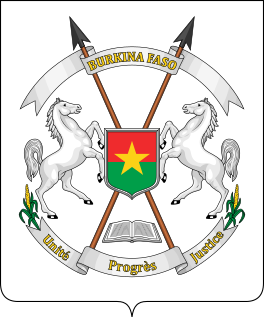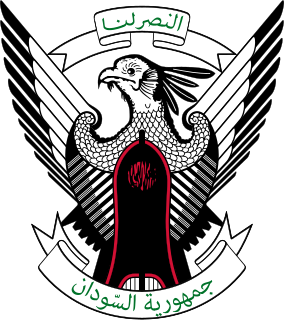The Rassemblement Démocratique Africain, commonly known as the RDA and variously translated as African Democratic Assembly and African Democratic Rally, was a political party in French West Africa and French Equatorial Africa which was important in the decolonization of the French empire. The RDA was composed of different political parties throughout the French colonies in Africa and lasted from 1946 until 1958. At certain points, the RDA was the largest political party in the colonies in Africa and played a key role in the French government headed by the Democratic and Socialist Union of the Resistance (UDSR). Although the regional party largely dissolved in 1958 with the independence votes for the colonies, many of the national parties retained the RDA in their name and some continue to do so. The political ideology of the party did not endorse outright secession of colonies from France, but it was anti-colonial and pan-Africanist in its political stances.

Territorial Assembly elections were held in French Upper Volta on 31 March 1957. The result was a victory for the Unified Democratic Party, which won 33 of the 68 seats in the Assembly.

Elections for the Legislative Assembly were held for the second time in the Gold Coast on 15 June 1954. They were won by Kwame Nkrumah's Convention People's Party, which took 71 of the 104 seats.

Elections for the Legislative Assembly were held for the first time in the Gold Coast on 8 February 1951. Although elections had been held for the Legislative Council since 1925, the Council did not have complete control over the legislation, and the voting franchise was limited to councils of chiefs. This was the first election to be held in Africa under universal suffrage.

Parliamentary elections were held in the Republic of Upper Volta on 7 November 1965. The country had been a one-party state since 1960, with the Voltaic Democratic Union-African Democratic Rally as the sole legal party. It therefore won all 75 seats in the National Assembly. Voter turnout was 97.4%.

Territorial Assembly elections were held in French Upper Volta on 30 May 1948, with a second round on 20 June. They were the first elections to the new Territorial Assembly, which had been created following the separation of Upper Volta from Ivory Coast the previous year.

A by-election to the French National Assembly was held in Upper Volta on 27 June 1948, alongside Territorial Assembly elections. The election was held following the separation of the territory of Upper Volta from Ivory Coast, which created a new constituency. The Voltaic Union won all three seats, which were taken by Henri Guissou, Mamadou Ouédraogo and Nazi Boni.

Elections to the French National Assembly were held in Upper Volta on 17 June 1951, as part of the wider French elections. The Voltaic Union (UV) won three of the four seats, which were taken by Joseph Conombo, Henri Guissou, Mamadou Ouédraogo, whilst Nazi Boni won the other seat on the Economic and Social Action in the Interests of Upper Volta list, although he remained a member of the UV.

Elections to the French National Assembly were held in the territory of Ivory Coast on 21 October 1945, with a second round on 4 November as part of the wider parliamentary elections. Voting was carried out using separate electoral colleges for citizens and non-citizens. François Reste de Roca and Félix Houphouët-Boigny were elected.

Elections to the French National Assembly were held in Ivory Coast on 17 June 1951 as part of the wider parliamentary elections. The African Democratic Rally and French Union each won a single seat.

Elections to the French National Assembly were held in Ivory Coast on 2 January 1956 as part of the wider parliamentary elections. The African Democratic Rally won both seats, which were taken by Félix Houphouët-Boigny and Daniel Ouezzin Coulibaly.

Territorial Assembly elections were held in French Ivory Coast on 30 March 1952. The result was a victory for the Democratic Party of Côte d'Ivoire – African Democratic Rally, which won 28 of the 50 seats.

Territorial Assembly elections were held in French Ivory Coast on 31 March 1957. The result was a victory for the Democratic Party of Côte d'Ivoire – African Democratic Rally (PCDI–RDA), which won 58 of the 60 seats. The other two seats were won by PCDI–RDA dissidents.
Elections to the French National Assembly were held in Chad and Ubangi-Shari on 17 June 1951. The territories elected four seats to the Assembly via two electoral colleges; the first college spanned both territories and elected one seat, whilst Chad elected two seats via the second college and Ubangi-Shari one. René Malbrant was re-elected from the first college, and Barthélémy Boganda from the second in Ubangi-Shari. In the second college in Chad, both seats were won by the Chadian Democratic Union.
Elections to the French National Assembly were held in Chad and Ubangi-Shari on 2 January 1956. The territories elected four seats to the Assembly via two electoral colleges; the first college spanned both territories and elected one seat, whilst Chad elected two seats via the second college and Ubangi-Shari one. René Malbrant was re-elected from the first college and Barthélémy Boganda from the second college in Ubangi-Shari. In the second college in Chad the Chadian Union and Chadian Social Action won one seat each, taken by Gabriel Lisette and Arabi el Goni respectively.

General Council elections were held in Chad on 15 December 1946, with a second round of voting on 12 January 1947.

Territorial Assembly elections were held in Chad on 30 March 1952. The result was a victory for Gaullist parties, with the Rally of the French People winning all 15 seats in the First College and the Chadian Democratic Union winning 24 of the 30 seats in the Second College.

General Council elections were held in Mauritania in December 1946; a second round on 5 January was not required as all seats were filled in the first round of voting. The Socialist and Republican Union emerged as the largest party, winning 16 of the 20 seats.

General Council elections were held in Niger on 15 December 1946, with a second round of voting on 5 January 1947. The General Council had been established by decree on 25 October 1946.

Parliamentary elections were held in Sudan on 15 November 1948.








